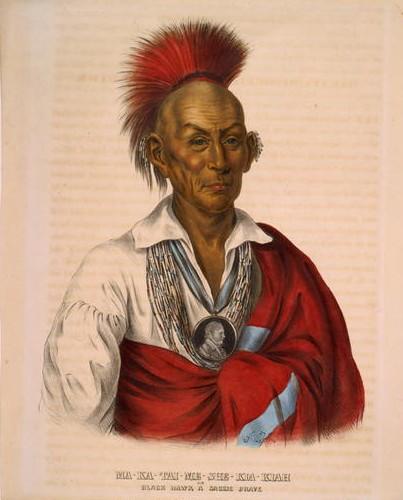A memorial stone now marks the spot in Fort Madison, Iowa where Chief Black Hawk gave his Farewell Speech on July 4, 1838. The stone was unveiled on June 30, 2012, with a day of Native American activities that were meant to pay tribute to the leader and warrior of the Sauk Indian Tribe.
During the War of 1812 he fought with the British against encroaching settlers in Illinois. Then, as the result of an 1804 treaty the Sauk and Fox tribes moved from Illinois to west of the Mississippi in 1828. Having to leave his birthplace didn’t sit well with Black Hawk, so between 1830 and 1831 he led a number of incursions across the Mississippi River. Each time he was persuaded to leave. But in April of 1832 he returned to his home leading some 1,500 others, and they couldn’t be easily persuaded to leave.
“Their return to northern Illinois sparked widespread panic among white settlers,” says James Lewis at Lincoln.Lib.NIU.edu. A number of battles and massacres on both sides raged from April to August of that year, until a final confrontation at the mouth of the Bad Axe River occurred when a U.S. gunboat killed hundreds of Native men, women and children. Black Hawk’s farewell speech was one of forgiveness and coming to peace with his “white friends” as he called them.
“I was once a great warrior; I am now poor,” he said in the speech. “Keokuk has been the cause of my present situation; but I do not attach blame to him. I am now old. I have looked upon the Mississippi since I have been a child. I love the great river. I have dwelt upon its banks from the time I was an infant. I look upon it now. I shake hands with you, and as it is my wish, I hope you are my friends.”
Black Hawk walked on three months later on October 3, 1838. Keokuk, who he mentions in the farewell speech, was also a warrior and leader and a rival of Black Hawks. But Keokuk sided with the Americans during the War of 1812. Before crossing the Mississippi to reclaim his homeland in 1832, Black Hawk went to Keokuk to ask him and his warriors to help; Keokuk refused.
Black Hawk’s farewell speech was a far cry from the surrender speech he gave just six years before in 1832. In it he talks about the Indian Removal Act of 1830 and says, “North America had never been an empty land, and at the time of European settlement was settled by Native American tribes with well-shaped and well-functioning societies. The European settlers and the cultural values they brought with them clashed with those of the native inhabitants almost from the minute the English landed at the mouth of the Chesapeake.”
This story was originally published on July 4, 2012.
